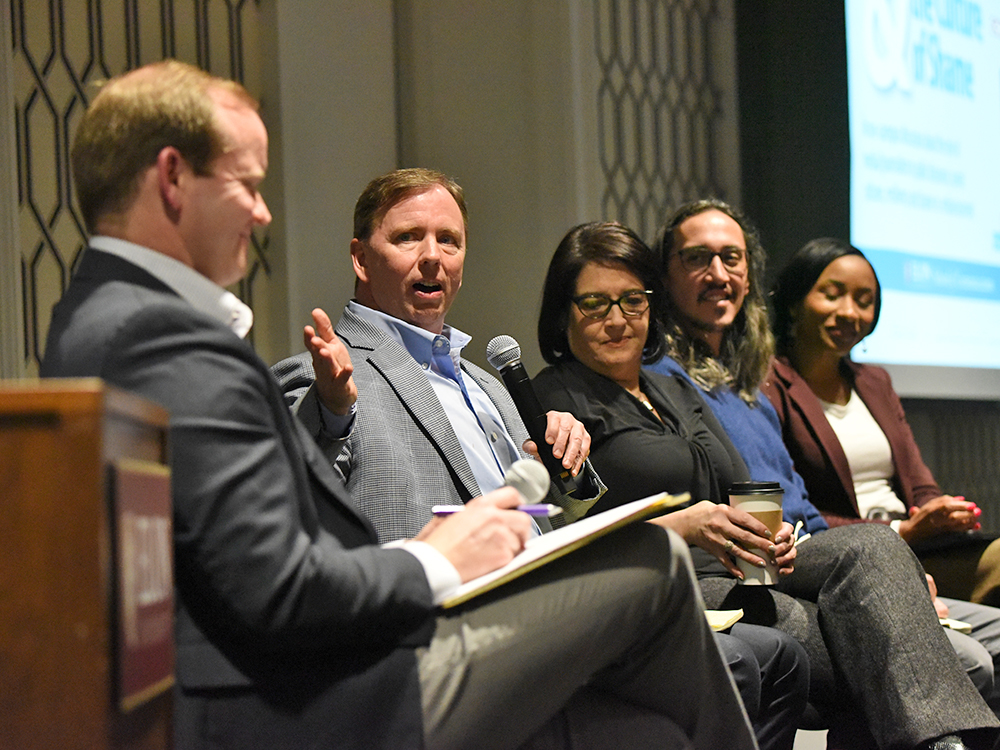During a March 4 on-campus discussion, panelists with expertise in media law, media ethics and psychology addressed cancel culture, a need for empathy, and the psychological impact of limitless access to information.
During a winding conversation at the School of Communications’ “Media and the Culture of Shame” panel discussion, participants addressed the perils of social media and information overload, the increasing demand to unpublish news, and the need for media members and consumers to be more empathetic.

Moderator Brooks Fuller, director of the North Carolina Open Government Coalition and assistant professor of journalism, steered the hourlong conversation on March 4, touching on the role of media and journalism, as well as the impact and origins of cancel culture. This included timely topics such as Gayle King’s questions about Kobe Bryant following his death and the increasing demand for the “Right to be Forgotten,” the subject of an August Radiolab podcast.
Panelists included Frank LoMonte, director of the Brechner Center for Freedom of Information at the University of Florida, Deborah Dwyer, a UNC doctoral student, Ryan Tuck, a media consultant, and Christal Carmichael, a psychology instructor at North Carolina Central University.
Photos of the panel are available on the school’s Flickr account.
“Because of archiving and because of Google and the ability to run searches on people that might surface things that are decades old, people have now started to be understandably so much more conscious about their reputation,” LoMonte said.
Dwyer, whose doctoral dissertation examines the rising phenomenon of unpublishing requests, said she does not believe the right to be forgotten is an accurate description.
“The way I try to explain it is the right to be forgotten is a misnomer. It’s actually the right to obscurity,” Dwyer said. “It is not erased, it is not forgotten. It is obscured.”

Dwyer added that media outlets should install and follow policies regarding unpublishing and apply it consistently. If not, power and privilege can lead to additional problems, where the wealthy and people of influence may have materials more easily removed or obscured, she noted.
The concept of unpublishing has arisen, in part, because of the permanence of the internet, which means that any digression, no matter how small or large, lives on forever. And while there are benefits to limitless access to news and information, Carmichael pointed out it can also be dangerous.
“I think the access to social media, sometimes the overindulgence in social media, hinders our ability to be really mentally healthy individuals,” said Carmichael, who specializes in helping people establish balance, eliminate burnout and understand the importance of mental health.
In his work with media companies, Tuck noted that he tells his clients to focus on what need they are serving, and for whom.
“We cloak ourselves as journalists a lot of times with this notion of we’re the first draft of history and the ‘O’ word of objectivity,” said Tuck, editor of NC Local, an email newsletter funded by Democracy Fund’s North Carolina Local News Lab. “Is the intention or the point of our coverage and our products to embarrass or to publicly shame? If so, that’s a problem. Is there a byproduct that causes shame or embarrassment?”
Following the panel discussion, Communications Dean Rochelle Ford said that she hoped attendees left with a better understanding of the perspectives of members of the media and today’s consumer.
“I thought that it was important to hear the voice of the journalists and the pressures that they’re under to tell the right story to their audiences that will be meaningful,” she said. “I thought it was great to hear how we communicate to each other and the impact that it has on people’s psyches, as well as the opportunity and need for us to be empathetic and forgiving in our society.”
During his campus stop, LoMonte also visited communications classes and student media organizations to talk about unpublishing, as well as the right to information and the impact the internet has on people’s lives.



